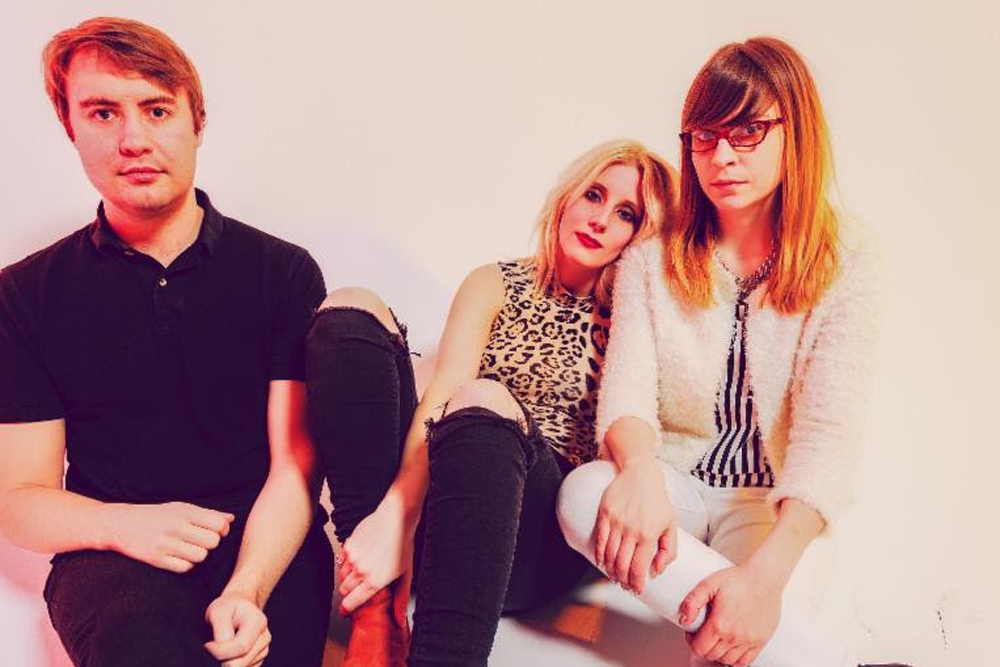Mish Barber-Way is ready to tell someone else’s story. After spending the past few albums writing only from her perspective, the lead singer of Vancouver-bred punk trio White Lung goes inside the mind of true-life serial killers on the band’s fourth album, Paradise (out now via Domino Records) — a move inspired by her investigative work as a writer and reporter for Broadly.
“I didn’t want to make these abstract, leave-it-up-to-the-reader kind of lyrics,” Way explains over the phone. “I wanted to create really strong, vivid images that could not be confused. Being very literal, that was something where I had to take on other voices because there were certain things I couldn’t say being myself.”
White Lung’s songwriting isn’t the only thing that’s evolved. While preserving the same tactful, crystalline sound that distinguishes records like 2012’s Sorry and 2014’s Deep Fantasy as prime examples of post-’00s punk, Paradise is easily the band’s most accessible album. Utilizing the techniques of producer Lars Stalfors (Alice Glass, Cold War Kids) — along with those of drummer Anne-Marie Vassilou and guitarist Kenneth William — modern, radio-friendly ballads like “Below” and “Hungry” usher White Lung into a more challenging, nuanced direction, one that pulls back the curtains and reveals the band’s softer, less acerbic side.
Although Way acknowledges the reaction longtime followers might have to the new album, she says they can either get on board or tread behind. “I understand that some old fans might have an aversion to it,” she says. “But then go listen to our old records. That’s what they’re sitting there for. I have to move on.”
A few days shy of Paradise’s release, Way spoke with SPIN about the making of White Lung’s new record, why it felt important to push her vocal capabilities, and why she admires prominent writer and social critic Camille Paglia.
In 2015, the band decided to take some time off. When did you realize White Lung needed to make a new record?
We all knew we had a deadline, and the label said to us that they wanted to see a new record around a certain time. We had to make the record in October, and Kenny [William] had been writing little bits and pieces all year, as did I. Then we decided who we were going to work with. I went up to Vancouver for a bit, but really, we went into the studio with maybe 30 percent of the record done.
We have a band that requires four people with only three members — we just have touring bassists that come on and don’t play on the record, they don’t write anything — so the songs don’t come to life until they’re in the studio because Kenny doesn’t have four arms. And if I’m playing bass while we’re practicing, I’m not completely focused on my vocal lines. When we went into the studio, so much was made there. It was about a month of hard work, and I wrote all my melodies, and I fixed and finalized all my lyrics in the studio. I had two weeks and it was just me and Lars working. It was a collage of all of our ideas coming together.
You’ve said that singing was an important aspect of the record. What does singing melodically mean to you, and why make it a goal for Paradise?
You always want to do something new. You want to challenge yourself and make the best record you can make. So one of my big challenges was making big anthemic choruses, pushing what I can do with my voice, and proving that I can sing not to everyone else but mainly to myself. Vocals have never been thought of as the star [for us], and we really wanted to make the vocals stand out. That happened because of the process, but also because of the production.
Your vocals on “Below” are exquisite. What was it like writing that song, and how did you feel when you heard the finished product?
I love that song so much. But the thing that was funny about that song was that Kenny had the guitar parts kicking around for a while. He played it for me a few times but it wasn’t resonating. Then he did something in the studio where he either switched out a pedal, or he changed the tone and built the bass line around it. When I heard it, I was excited but also very intimidated because he’d never given me so much space. I had anywhere I could go; it was such a loose structure.
Normally, when I hear a Kenny song, I’m like, “Okay, this is where I can sing,” because the guitar’s so frantic and chaotic, and I have to maneuver myself in at the right point. But with “Below,” it was this big, blank sheet of paper that I could do anything over. I remember saying to Lars, “F**k it, I gotta just make this song pretty.” I wanted to make this my version of a ballad.
Was the decision to go down a poppier, more accessible road reflective of how you’re currently feeling?
Of course your record is going to be a reflection of your life and the things you’re going through. I am content, more so than I’ve ever been. It’s also because of age, too. I’m not walking around extremely pissed off at the world anymore. I’m still passionate about my views, but you start to go, “Hey, that’s what life is,” and you start to relax a little bit. You’re not walking around ready to stab anyone that looks at you wrong. I found a lot of sanity in that.
Some of the voices you channel on Paradise come from really violent people. How did writing these songs affect you?
It’s fun to do that. It’s like putting yourself in someone else’s head and living out their situation through your own personality. The song “Sister” is written from the perspective of [convicted serial killer] Karla Homolka, and imagining her apologizing to her sister. A song like “Narcoleptic” has so many voices. I’m referencing everything from [writer] Jim Goad to Captain Beefheart.
There are also songs on the album that are very linear, like “I Beg You.” That’s a song about fighting with the person you love and wanting the fight to be over. “Paradise” is a love song for my husband; it’s very straightforward. “Kiss Me When I Bleed” is about a little rich girl that falls in love with a garbage man who lives in a trailer park. Fiction gave me a lot of freedom that I wouldn’t have had in the past.
Beauty and the preservation of beauty comes up a lot on Paradise. What’s your relationship like with beauty, and how did that play into the album?
Like many women, it’s a very love/hate, complicated relationship. Camille Paglia is probably my favorite writer of all time, and she talks about beauty in the context of art and history and religion, which I really appreciate.
She’s a historian by nature, and I was watching these debates — they’re called the Munk Debates, and it was a debate on gender with [author] Hanna Rosin and [columnist] Maureen Dowd against Camille Paglia and [journalist/author] Caitlin Moran. They did these pre-interviews with them and Camille Paglia talked about the value in the beautiful woman and how a certain brand of feminism writes off the beautiful woman as just that; that she hasn’t contributed anything. Whereas, we have to realize that the beautiful woman has contributed so much to culture.
With Paradise being a more melodic album and a different direction for the band, where do you see future White Lung albums going at this point?
It’s a funny thing because you finish your record, you record it, then you’re done, and no one’s going to hear it for six months. Now comes the time where we have to play this record over and over for everyone and the public gets to listen to it. It’s funny when you’ve completed that task and the creation of it so long ago because, at this point, the record already feels old to me. The cycle feels complete but in reality, the cycle is just beginning. So I haven’t even thought about where we’re going next, I just have to focus on playing this record and performing live and doing it justice.





